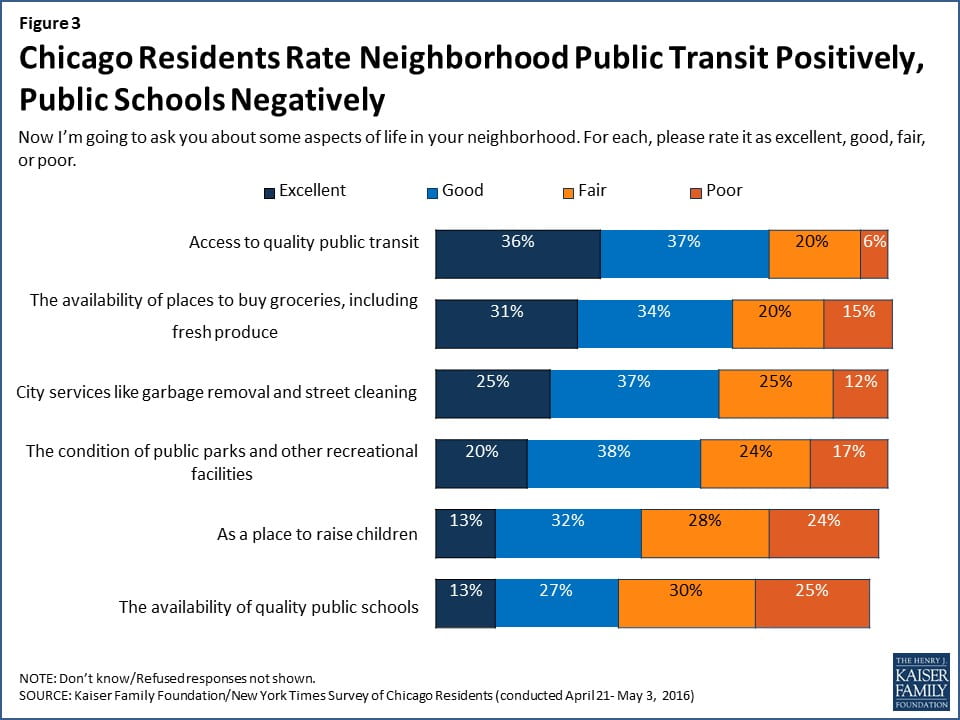Chicago Resident’s Views Both Reinforce and Surprise
Earlier this month, the New York Times and the Kaiser Family Foundation conducted a survey of 1,123 Chicago residents aged 18 and over, randomly selected, to gather information of their current views toward their city, and to a degree their state and the country as a whole. The survey results were published in total, and divided by ethnicity (White, Black, Hispanic). Top concerns like crime, schools, and the political climate were addressed.
Across the board, survey respondents revealed a bleak analysis of Chicago’s current direction. Overall, 75% said that the city was ‘on the wrong track’; Hispanic residents were least pessimistic (72%) and black residents most pessimistic (85%).
Although crime is the number one concern of residents, 72% of all residents also felt that their neighborhoods were either ‘very safe’ or ‘somewhat safe’.
One of the more interesting questions posed was an open-ended question asking residents to name the single biggest problem facing Chicago today. All segments listed Crime most frequently, but black (63%) and Hispanic (60%) residents listed it much more frequently than did white residents (35%). Interestingly, 72% of all residents also felt that their neighborhoods were either ‘very safe’ or ‘somewhat safe’. Black residents had the least favorable outlook, but 60% still held a favorable (very safe or somewhat safe) rating. Unfavorable ratings regarding neighborhood safety were ‘not too safe’ and ‘not safe at all’.
The discrepancies in who felt their neighborhoods were ‘not too safe’ were not very large between black (21%), Hispanic (18%), and white (14%) residents. However, there was a notable discrepancy in who feels safety is a pervasive concern where they live. Black residents were nearly seven times more likely to rate their neighborhood ‘not safe at all’ (20%) than white residents (3%).
The survey also sought residents’ take on what plays the biggest role in Chicago’s high crime rate. Although there were discrepancies in the overall score by group, all groups feel the lack of strong family structures as the biggest contributor to crime (37%). A lack of educational opportunities and a lack of good jobs are also both seen as significant factors, and in nearly equal measure to each other (19% and 21%, respectively). Only 7% of all groups feel a lack of police presence is the decisive cause of high crime. More details on the perceived roles contributing to crime can be seen in the table below.
Despite residents being most concerned about crime, the majority believe new police superintendent Eddie Johnson should make reforming the police department his top priority (43%) over reducing crime (38%). Hispanic residents were the only group surveyed who felt lowering crime should be Mr. Johnson’s top priority (45% over 42% for reform).
Residents were asked about six policy recommendations for police reform to reduce police-involved shootings, and to score whether they would be effective (‘very effective’ or ‘effective’) or not effective (‘not very effective’ or ‘not at all effective’). A majority of residents, including all surveyed groups, thought all six efforts would be net effective, but two stood above the others, with 90%+ effectiveness ratings; increasing police use of dashboard video cameras and body cameras, and increasing training for police officers on how to calm down a violent situation.
For black and Hispanic residents, Education/Schools and Police/Police Shootings were the only issues other than Crime listed as the city’s biggest problem by more than 5% of survey respondents. Education/Schools were frequently listed by white residents as well, but they also frequently (more than 5% of respondents) listed the Economy, City/State Budget Issues, and Political Corruption as the city’s biggest issue.
 As the figure at left shows, courtesy of Kaiser Foundation, Chicago residents in general rated access to quality public transit favorably (73% good or excellent). A majority of Chicago residents have favorable ratings of access to fresh produce (65% favorable), streets and sanitation (62% favorable), and the condition of parks and other recreational facilities (58% favorable). Chicago residents have a negative outlook of Chicago as a place to raise children (45% favorable), which probably in part is informed by their outlook toward Chicago Public Schools (40% favorable).
As the figure at left shows, courtesy of Kaiser Foundation, Chicago residents in general rated access to quality public transit favorably (73% good or excellent). A majority of Chicago residents have favorable ratings of access to fresh produce (65% favorable), streets and sanitation (62% favorable), and the condition of parks and other recreational facilities (58% favorable). Chicago residents have a negative outlook of Chicago as a place to raise children (45% favorable), which probably in part is informed by their outlook toward Chicago Public Schools (40% favorable).
Only 25% of Chicagoans approve of the overall job Mayor Emanuel is doing, but 44% believe he cares about the needs and problems of people like themselves. Many other questions about crime, demographics, and other issues were asked in this survey, the full results of which can be found at the Kaiser Family Foundation’s website. Additionally, MuniNet provides you with updated information on Chicago’s demographics and employment data.
by Jeffrey L Garceau

